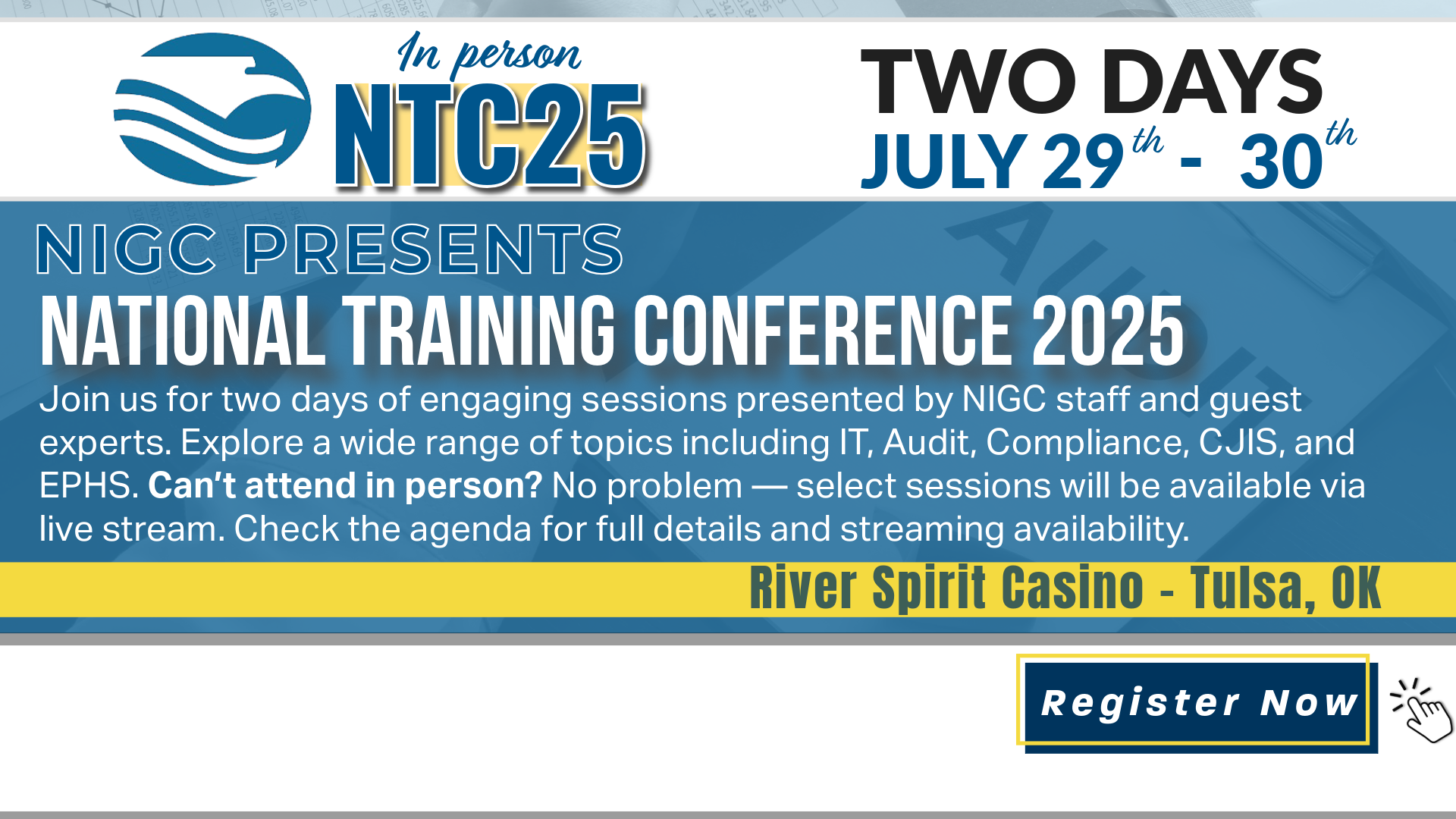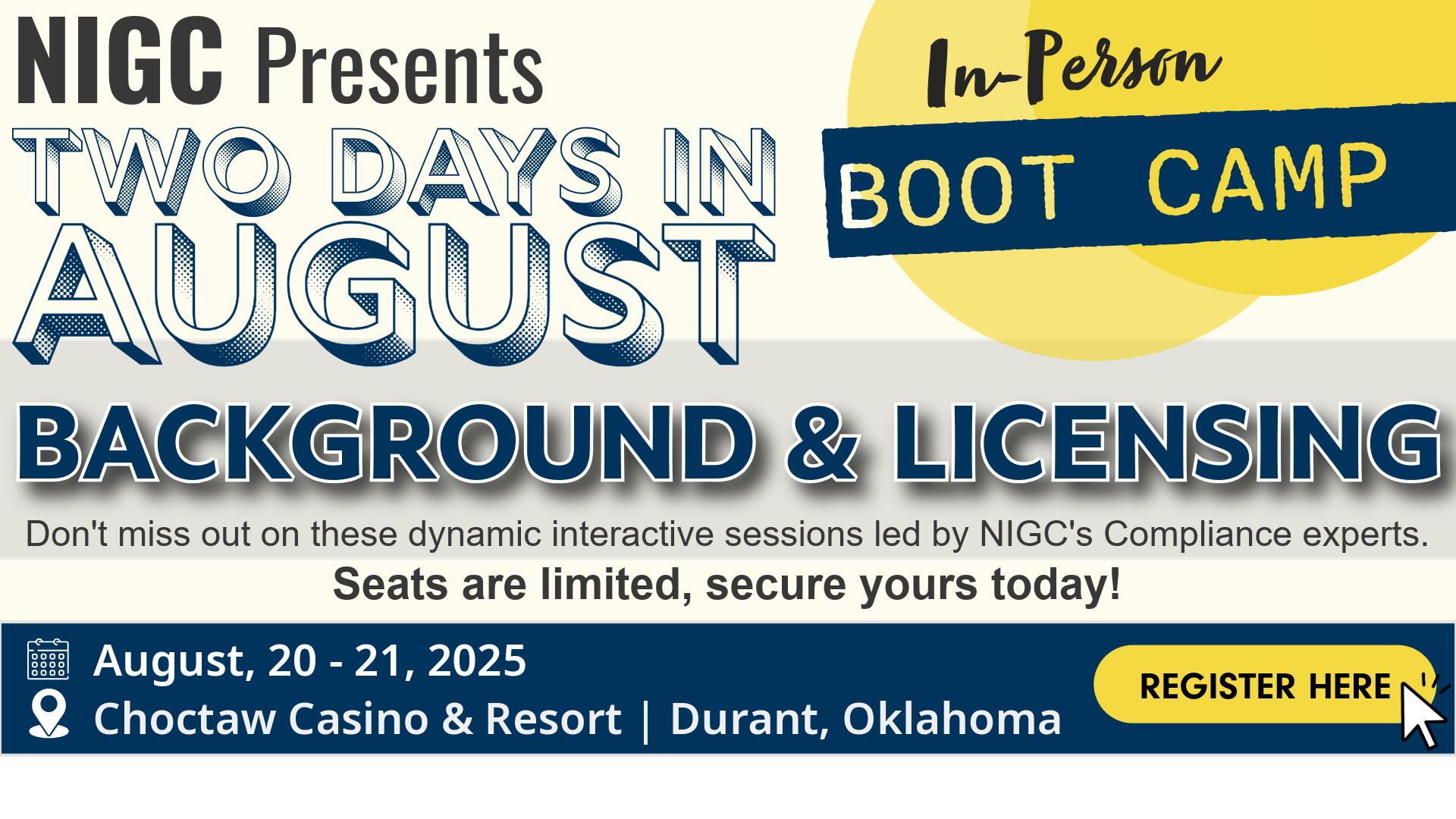| Date | Publication Number | Title | Topic |
|---|---|---|---|
| 01/14/1998 | No. 1998-1 | Charitable Gaming | Class II, III & Charitable Gaming |
Charitable Gaming
Date: January 14, 1998
Subject: Charitable Gaming
The National Indian Gaming Commission (NIGC) is asked frequently whether organizations that conduct gaming on Indian lands solely for the purpose of supporting their charitable purposes are subject to the regulatory provisions of the Indian Gaming Regulatory Act (IGRA). This Bulletin is intended to provide guidance to tribes with charitable gaming activities within their jurisdictions.
The only form of gaming conducted on Indian lands that is not subject to the regulatory provisions of the IGRA is class I gaming -- social gaming for prizes of minimal value and traditional Indian gaming conducted during tribal ceremonies or celebrations. 25 U.S.C. §§ 2703(6), 2710(a)(1). All other forms of gaming (class II and class III) conducted on Indian lands, regardless of whether for commercial, governmental or charitable purposes, are subject to the regulatory provisions of the IGRA. "Any class II gaming on Indian lands shall continue to be within the jurisdiction of the Indian tribes, but shall be subject to the provision of this Act." 25 U.S.C. § 2710(a)(2). Class III gaming activities are lawful on Indian lands only if those gaming activities are: authorized by a tribal ordinance approved by the Chairman, permitted in the state, and conducted in conformance with a tribal-state compact 25 U.S.C. § 2710(d).
The IGRA does distinguish tribally owned gaming from non-tribally owned gaming. Gaming operations on Indian lands that are owned by persons or entities other than an Indian tribe are subject to special requirements. Except for certain grandfathered individually owned class II gaming operations, non-tribal gaming operations are subject to tribal licensing requirements that must be as stringent as state law requirements for similar gaming. 25 U.S.C. § 2710(b)(4)(A). In addition, all non-tribal gaming operations, including individually owned grandfathered gaming operations, must: (1) be audited annually and the results submitted to the Commission; (2) be licensed and regulated by the tribe pursuant to a tribal ordinance approved by the Chairman; (3) pay not less than sixty percent (60%) of the net revenue to the tribe; and (4) pay a fee assessment to the NIGC. 25 U.S.C. § 2710(b)(B)(I). Non-tribal charitable gaming operations on Indian lands must comply with these provisions.(9)
While the IGRA does not expressly exempt any charitable gaming operations from the requirements of section 2710(b)(4)(A) and (B), the legislative history of the IGRA does express the Senate Committee's intent to treat tribal social or charitable organizations that operate gaming to support their charitable purposes as tribal gaming, rather than individually owned gaming. In a section of the Senate Report entitled "Individually owned class II games," the Committee explained why it believed that non-grandfathered individually owned class II games should be licensed by the tribes and be subject to state gambling laws. It went on to state:
These games (non-grandfathered individually owned class II games) are not to be confused with units of a tribe or social or charitable organizations that operate gaming to support their charitable purposes; such games are not covered by this paragraph but rather will come under tribal gaming.
Senate Report No. 446, 100th Cong., 2nd Sess. 12 (1988). Thus, charitable gaming conducted by tribal social or charitable organizations or units of a tribe are not subject to the requirements of section 2710(b)(4) and (B) unless otherwise required by the tribe. Such organizations and units would still be subject to the same requirements of the IGRA applicable to tribal gaming. Thus, they must be audited annually and the results submitted to the Commission. They must be licensed and regulated by the tribe, their key employees and primary management officials must be subject to background investigations and suitability determinations, and they must pay a fee to the NIGC based on class II gaming revenues.
In summary, all charitable gaming operations on Indian lands are subject to the IGRA. Non- tribal charitable gaming operations must be in compliance with the requirements of 25 U.S.C. § 2710(b)(4)(A) and (B). Tribal social or charitable organizations that conduct gaming to support their charitable purposes are subject to the same requirements of IGRA as tribal gaming operations.
For further information contact: the NIGC Office of the General Counsel at (202) 632-7003.
(9)An Indian tribe would be authorized to donate all or part of the sixty percent (60%) of net revenues to the charitable organization that conducted the gaming activity. See, 25 U.S.C. § 2710(b)(2)(B)(iv).










